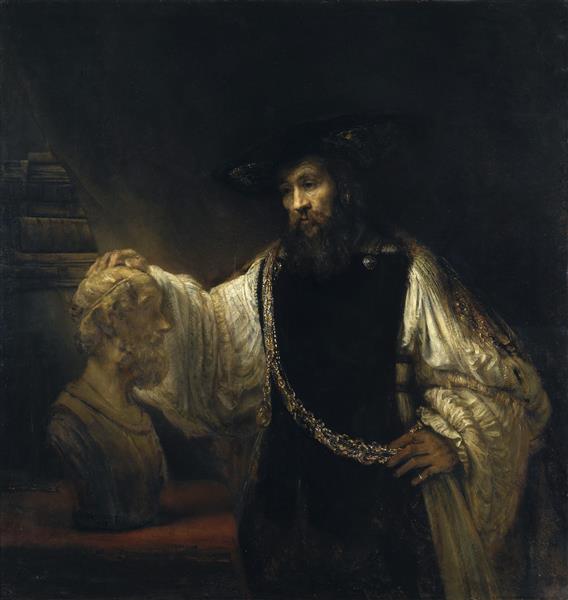Beskrivelse
Arbejdet "Aristoteles, der overvejer en buste af Homer", malet af Rembrandt i 1653, opføres som et magtfuldt vidnesbyrd om kunstnerens mestring i brugen af Chiaroscuro og dens dybe evne til at udforske menneskeheden og intellektualitet. I dette arbejde repræsenterer Rembrandt Aristoteles, den bemærkelsesværdige græske filosof, på et tidspunkt med kontemplation foran Homers bust, den legendariske digter af antikken. Interaktionen mellem disse to titaner af tankegang og litteratur understreger dialogen mellem fornuft og kreativitet.
Aristoteles præsenteres i forkant med et udtryk, der afspejler både beundring og refleksion. Hans blik er på vej mod Homers buste som et symbol på litterær tradition og søgen efter viden. Brugen af Chiaroscuro, en karakteristisk teknik for Rembrandt, fremhæver den tre -dimensionalitet i Aristoteles ansigt, hvilket forbedrer dens træk og giver den en næsten monumental karakter. Belysningen, der ser ud til at dukke op fra bunden af billedet, skaber en dramatisk kontrast, der kulminerer i en subtil glorie omkring Homers bust, hvilket antyder dens relevans og ærbødighed.
Farven spiller en afgørende rolle i denne sammensætning. Paletten er overvejende mørk med rig brun, oker og guldfarver, der tegner sig for det næsten akademiske miljø i undersøgelsen. Denne farvebehandling intensiverer ikke kun atmosfæren, men fremhæver også de mest emblematiske elementer i figuren af Aristoteles, såsom dens toga og deres hår, der er oplyst, så de fremkalder en følelse af værdighed og psykologisk dybde. Derudover tilføjer tekstur på lærredet, synlig i det løse børstestræk, der bruges af Rembrandt, en berøringskomponent til værket, hvilket fører seeren til en mere intim forbindelse med maleren og dens proces.
I baggrunden antydes arkitektoniske elementer, at selv om det næppe er afgrænset, antyder et akademisk rum, muligvis et bibliotek eller en undersøgelse, hvor viden reddes og respekteres. Repræsentationen af dette miljø fremhæver forholdet mellem filosofisk tænkning og klassisk civilisation, et tilbagevendende tema i Rembrandts arbejde, der ofte var interesseret i menneskeheden bag de store historiske karakterer.
Interessant nok blev dette maleri skabt på et tidspunkt, hvor Rembrandt gennemgik alvorlige personlige og økonomiske vanskeligheder, hvilket ser ud til at tilføje et lag af interesse til fortolkningen af værket. Søgningen efter visdom og mening, der afspejles i Aristoteles handling, når man overvejer bysten, kan også ses som en parallel med kunstnerens interne kamp.
"Aristoteles, der overvejer en buste af Homer", er blandt de mest repræsentative værker af kunsten i den hollandske gyldne tidsalder og er stadig genstand for studie og beundring. Gennem sin mesterlige styring af lys og skygge, ud over dets møde mellem filosofisk og kunstnerisk, inviterer Rembrandt os til at reflektere over dybden af viden og arv fra store sind, understreger denne kunst i sidste ende, i sidste ende forekomst, et middel til at overveje det menneskelige tilstand. Arbejdet bevarer ikke kun mindet om disse tænkere, men resonerer også i vores nutid med deres tidløse relevans.
KUADROS ©, en berømt maling på din væg.
Håndlavede olie -malerier med kvaliteten af professionelle kunstnere og den karakteristiske segl af KUADROS ©.
Billeder Reproduktionstjeneste med tilfredshedsgaranti. Hvis du ikke er helt tilfreds med kopien af dit maleri, refunderer vi dine penge 100%.

